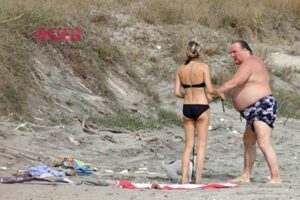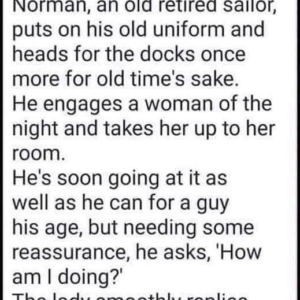
San Foca (LE), 21/08/2014
Gerard Depardieu con la compagna Clementine Igou ed il cane al mare su una spiaggia libera desolata
Ph. Fabio Serino / MASSIMO SESTINI
French actor Gérard Depardieu has become the focus of an escalating international scandal following the release of a controversial television documentary on December 7, 2023.
In the program, which aired on France 2, the veteran actor made a series of inappropriate, shocking, and widely condemned remarks about women, triggering immediate and severe consequences from multiple institutions and public authorities.
As a result of the controversy, both Belgium and Canada have taken formal action to revoke official honors that had previously been awarded to Depardieu.
Additionally, his wax figure was permanently removed from the Paris Grevin Museum after a public outcry.
In France, the Minister of Culture, Rima Abdul Malak, confirmed that Depardieu could face suspension or complete expulsion from the Legion of Honor, France’s highest civilian distinction, pending a formal disciplinary review by the Legion’s council.
According to reports, Depardieu’s lawyers have placed his Legion of Honor award “at the disposal” of the Ministry of Culture while these proceedings are under consideration.
The scandal initially gained traction when the Belgian commune of Estampuis revoked Depardieu’s honorary citizenship, which he had received in 2013 during a period of residence there.
Shortly thereafter, Quebec’s Premier, François Legault, announced that Depardieu had been removed from the National Order of Quebec, one of the province’s highest civilian honors.
In a formal statement, Legault emphasized, “The scandalous remarks made by Gérard Depardieu in front of cameras have justifiably shocked the international public.
His behavior casts a shadow on the reputation of the members of the National Order of Quebec.”
This series of actions highlighted how Depardieu’s comments were being treated seriously not only in France but also across multiple international jurisdictions where he had previously been celebrated.
Adding to the public backlash, the Grevin Museum in Paris, where Depardieu’s wax figure had been on display since 1981, decided to remove the figure following repeated complaints from visitors and negative reactions on social media platforms.
Museum officials stated that the removal was motivated by public sentiment and the desire to respect visitors’ feelings about the controversy.
The museum’s decision came as an additional symbolic blow to the actor’s reputation, underlining the widespread condemnation of his statements.
The documentary itself provided previously unseen footage from Depardieu’s trip to North Korea, revealing behavior that critics described as inappropriate and uncomfortable.
In the film, Depardieu allegedly made sexually suggestive comments involving a young girl and delivered other remarks that placed his translator in awkward situations.
The broadcast prompted extensive debate in the media and among the public regarding the boundaries of personal behavior, celebrity accountability, and the ethics of documentary filmmaking.
Depardieu’s legal team countered these claims, arguing that the footage had been selectively edited and filmed in intimate and private settings, though it was recorded during the filming of the North Korea documentary.
Depardieu’s legal troubles are not new. Since 2020, multiple women have publicly accused him of sexual misconduct.
Actress Charlotte Arnault filed a rape allegation, while others have reported incidents of sexual harassment.
Most recently, in December 2023, actress Hélène Darras submitted a formal complaint accusing Depardieu of sexual harassment that allegedly occurred during a film shoot in 2007.
These prior allegations have compounded public concern about Depardieu’s behavior and intensified scrutiny over whether he should continue to hold positions of honor and distinction.
The question of Depardieu’s status within the French Legion of Honor has become a central issue in the scandal.
The Legion of Honor, established by Napoleon Bonaparte in 1802, recognizes individuals for outstanding achievement and service to France.
Depardieu was awarded the rank of Chevalier (Knight) in 1996. The Legion’s code allows for disciplinary action—including censure, suspension, or expulsion—if a member engages in conduct “contrary to honor.”
Minister Rima Abdul Malak announced that the Legion’s council will convene to review Depardieu’s case and determine the appropriate course of action, placing his membership under formal scrutiny for the first time in decades.
Through his lawyers, Depardieu has protested the public and institutional response, describing it as a “media lynching” and questioning the role of the Ministry of Culture in actively participating in his condemnation.
His legal representatives emphasized that the documentary footage was taken in private settings and accused the media of selective editing, though the remarks were filmed openly during a documentary project.
Depardieu’s defense underscores the tension between public accountability, artistic documentation, and personal privacy in cases involving high-profile figures.
As the scandal continues to unfold, Depardieu faces potential consequences that could significantly alter his legacy.
His international reputation, professional standing, and the honors he has accumulated over decades are all under intense scrutiny.
Observers are closely monitoring the Legion of Honor’s disciplinary review, which could result in Depardieu’s suspension or permanent expulsion from one of France’s most prestigious institutions.
The situation marks a dramatic fall from grace for an actor who has long been celebrated both in France and internationally for his contributions to cinema, highlighting the increasingly public and global consequences of personal misconduct.





